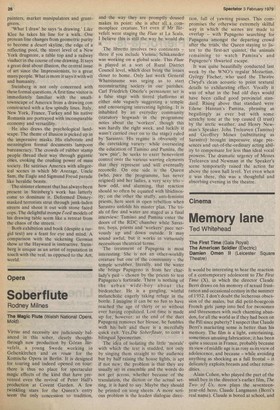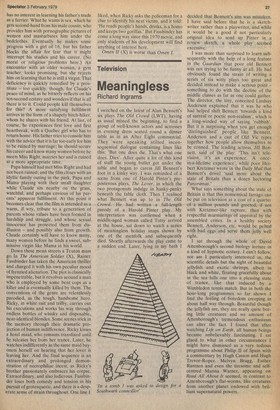Memory lane
Ted Whitehead
The First Time (Gala Royal) The American Soldier (Electric) Damien Omen II (Leicester Square Theatre) It would be interesting to hear the reaction of a contemporary adolescent to The First Time (X), in which the director Claude Berri draws on his memory of sexual frustration and occasional ecstasy in the summer of 1952. I don't doubt the lecherous obsession of the males, but did petit-bourgeois French girls jump into bed for twosomes and threesomes with such charming abandon, for all the world as if they had been on the Pill since puberty? I suspect that Claude Bern's marketing sense is better than his memory. The film is a light, entertaining, sometimes amusing fabrication; it has been quite a success in France, probably because its view of middle age is as rosy as its view of adolescence, and because — while avoiding anything as shocking as a full frontal — it delicately exploits breasts and other rotundities.
Alain Cohen, who played the part of the small boy in the director's earlier film, The Two of Us, now plays the seventeenyear-old hero, Claude Langmann (Bern's real name). Claude is bored at school, and has no interest in learning his father's trade as a furrier. What he wants is sex, which he gets second-hand from his male cousin, who provides him with pornographic pictures of women and masturbates him under the bedclothes. Eventually he makes some progress with a girl of 16, but his father blocks the affair for fear that it might interrupt his studies and his career. (No moral or religious problems here.) An encounter with an older woman, a gym teacher, looks promising, but she rejects him on learning that he is still a virgin. That deficiency is quickly remedied by a prostitute — too quickly, though, for Claude's peace of mind, as he bitterly reflects on his ten-second ecstasy and wonders if that is all there is to it. Could people kill themselves for this? A more satisfying fulfilment arrives in the form of a shapely hitch-hiker, whom he shares with his friend. At last, of course, he experiences first love and first heartbreak, with a Quebec girl who has to return home. His father tries to console him with the advice that it is far too early for him to be ruined by marriage; he should secure his career and know many women before he meets Miss Right, marries her and is ruined at a more appropriate time.
Papa himself had met Miss Right and had not been ruined; and the film closes with an idyllic family outing in the park, Papa and Mama playing with their small daughter while Claude sits nearby on the grass, watchful, and perhaps envious of his parents' apparent fulfilment. At this point it becomes clear that the film is intended as a warm, if wry, tribute to a generation of parents whose values have been formed in hardship and struggle, and whose sexual innocence has protected them from disillusion — and possibly also from growth. Claude certainly will have to know many, many women before he finds a sweet, submissive virgin like Mama in his world.
Down these mean streets a Teuton must go. In The American Soldier (X), Rainer Fassbinder has taken the American thriller and charged it with his own peculiar mood of frenzied alienation. The plot is classically impenetrable, but it revolves around a man who is employed by some bent cops as a killer and is eventually killed by them. The conventions of the genre are relentlessly parodied, as the tough, handsome hero. Ricky, in white suit and trilby, carries out his executions and works his way through endless bottles of whisky and disposable, near-identical blondes. Some scenes stick in the memory through their dramatic projection of human indifference. Ricky kisses a hotel maid, who remains transfixed until he releases her from her trance. Later, he watches indifferently as the same maid bayonets herself on hearing that her lover is leaving her. And the final sequence is an extraordinary and prolonged demonstration of necrophiliac incest, as Ricky's brother passionately embraces his corpse. Extraordinary, and also ludicrous. Fassbinder loses both comedy and tension in his pursuit of grotesquerie, and there is a desperate sense of strain throughout. One line I liked, when Ricky asks the policeman for a clue to identify his next victim, and it told: 'He reads people's hands, drinks, is a homo and keeps two gorillas.' But Fassbinder has come a long way since this 1970 movie, and only students of his development will find anything of interest here.
Omen II (X) is worse than Omen I.



































 Previous page
Previous page